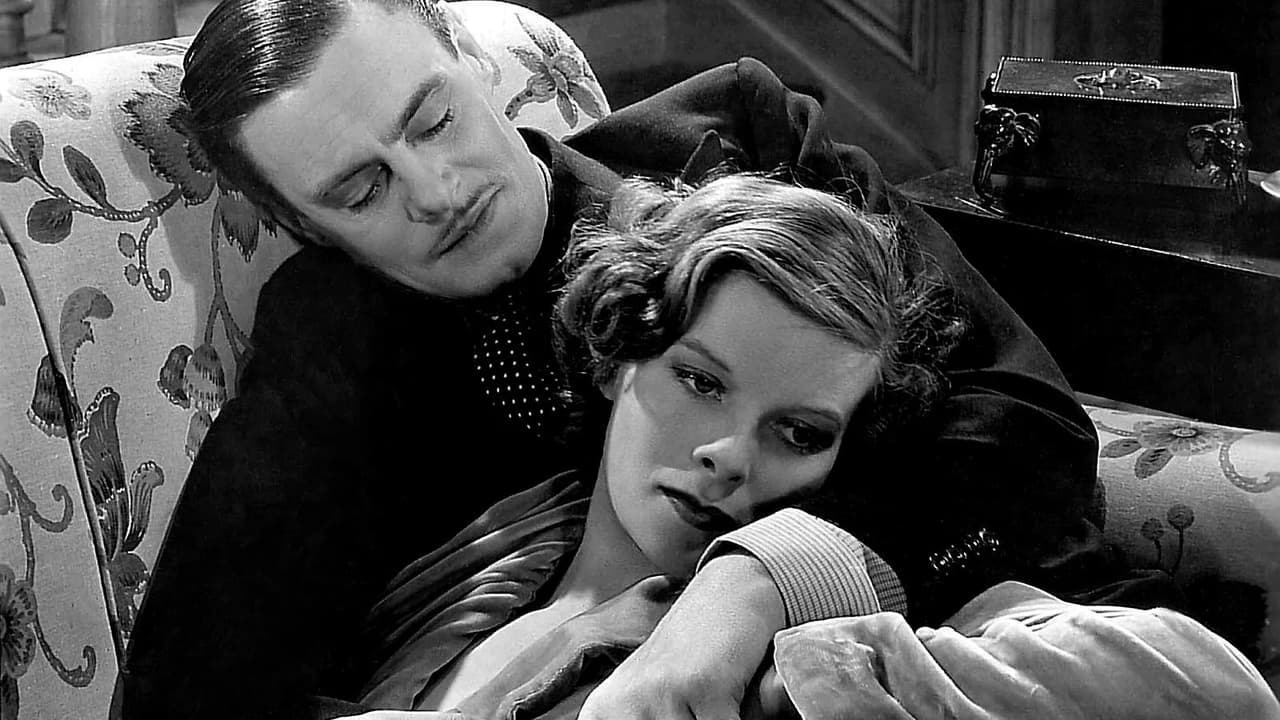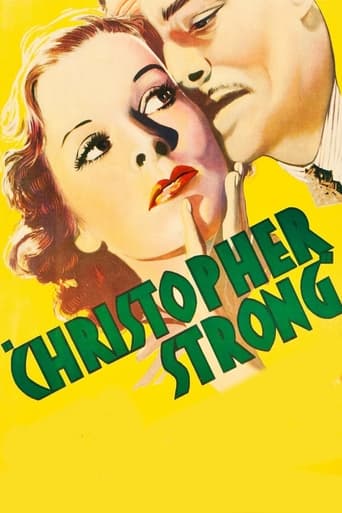WiseRatFlames
An unexpected masterpiece
Aedonerre
I gave this film a 9 out of 10, because it was exactly what I expected it to be.
pointyfilippa
The movie runs out of plot and jokes well before the end of a two-hour running time, long for a light comedy.
Yash Wade
Close shines in drama with strong language, adult themes.
gkeith_1
My observations about this movie:This isn't pre-code. It's later-code. The code began 1930, and movie-making didn't pay much attention to its strictures until around 1934-1935 when the Hayes Code church ladies really tightened the screws. This is according to my recent film studies and theatrical critiquing coursework at university. Near-nudity Hollywood cinema was more prevalent before the early 1930s, yes, but in this movie (1933) there is a middle ground approach between total depravity and future movies where nonmarital pregnancies were pretended to not exist.Billie Burke was a Broadway stage star in the 19-teens, for impresario Charles Frohman. Later, she married Florenz Ziegfeld against Frohman's warnings (Frohman died 1915 in Lusitania disaster). Burke "retired" from show business. Ziegfeld lived high on the hog, and after many costly and fabulous theatrical productions was wiped out financially in the 1929 stock market crash. He died in 1932, a ruined man. Burke had tons of his debts to pay, so she went into movie acting. Her role in "Christopher Strong" (released 1933; maybe production began 1932) was dull, witless, dependent and boring -- at least it got a head start on paying Flo's bills. Burke's later roles included being airy and light in musicals, i.e. Glinda, the Good Witch of the North in "Wizard of Oz"/Judy Garland, and Mrs. Livingston Belney in 1949's "Barkleys of Broadway"/Fred Astaire-Ginger Rogers. Burke was the daughter of an English circus clown named Billy Burke. Billie's real name was Mary William Ethelbert Appleton Burke.Colin Clive was Dr. Frankenstein in two Frankenstein movies. One would not think of him as a romantic person, but in Christopher Strong he overcomes his wooden shell and actually falls for bold and daring Katharine Hepburn's virginal career-oriented athletic persona. One look from him at her famous slinky form-fitting moth costume was just enough to make him fall head over heels away from his boring, clingy Billie Burke spouse.Hepburn's Lady Cynthia Darrington was broke. She must also have lost tons of money in the stock market crash and ensuing worldwide Great Depression. She lives in a crappy looking apartment, but has household help and is known as Your Ladyship. Indeed, she did not look like a "lady". She was very mannish, except for wearing that moth dress. The director was mannish, and I think Cynthia's riding outfits looked a lot like pictures I have seen of Dorothy Arzner. Cynthia did not have Arzner's mannish hairstyle. At any rate, think of Lady Darrington as a leftover from a Downton Abbey-type family who lost their riches during World War One. She must have pawned a lot of jewels to pay her maids' salaries, and slept with a lot of wealthy men (off-canvas, of course) to pay for those expensive airplanes and flying lessons. Hepburn wears a DRESS in this movie (moth costume), plus a gypsy SKIRT in her movie "The Little Minister (1934).I have also studied aviation, and have heard many times that Cynthia was designed as a study of the real life of Amelia Earhart who died 1937, four years after the release of this movie. Maybe Amelia was also pregnant by one of her many male financial contributors, and decided to "disappear". The ending of Christopher Strong perhaps "strongly" predicted the future. Amelia also looked masculine at times, but just like Cynthia she really liked men and enjoyed their comforts much more than the public was led to believe. Also in real life, both Earhart and Katharine Hepburn knew Howard Hughes. Hughes contributed majorly to Hepburn's movie career expenses. Howard, also a famous aviator and inventor, may also have paid a lot of Amelia's expenses. 10/10.
ladylavende
Christopher Strong is a film of clichés- daring, independent woman meets devoted, trustworthy husband of kind, albeit prudish wife. He's never cheated on his wife, she's never been in love. Will a clandestine affair ensue? Oh, gee, the suspense might leave you hanging.But before you write this one off, remember that it stars the incomparable Katharine Hepburn in one of her first screen roles. And she is divine. I love Kate when she's strong and brash and carelessly independent. She breathes life into what would be a tired role in any other actress's hands. Her performance makes you believe at once in the worldliness and naiveté of an aviatrix who's never known love before.The ending is rushed and lacks credibility. It feels forced, as though they had to give some closure to a rather untidy relationship. It would have been better without the closure. But through it all, you believe in Hepburn; even in the final moments, you believe that maybe she regrets her irreversible decision after all.It's not an original look at adultery, but Kate's performance gives you an interesting view of the other woman- one who is brave but scared, happy but miserable.
jrgirones
It's ironical this film to be titled as the main male character, above all when this raises among film classics for its accurate depiction, not only of the main female one, but also of the female secondary roles. It is probably due to the fact that it is directed by a woman, but the talent of Arzner goes beyond through accurate cinematography and a sense for lyrical melodrama far from the soapy tone of the majority of its contemporaneous. Katharine Hepburn is exulting as the brave woman always a step further its era, here in love for the first time with a married man. Particularly moving is the last sequence, with Hepburn trying to achieve the altitude record with her airplane as she confronts the most relevant facts of her story. A little gem to be discovered.
lugonian
CHRISTOPHER STRONG (RKO Radio, 1933), directed by Dorothy Arzner, with a haunting score by Max Steiner, began production as "A Great Desire." Starring Katharine Hepburn in her second feature film following her successful debut in A BILL OF DIVORCEMENT (1932), it pairs her opposite Colin Clive for the only time. Set in England, she plays Lady Cynthia Darrington, an enthusiastic aviatrix (possibly inspired on Amelia Earheart), who is over 21 and has never had a lover or an affair because she makes no time for it. All that changes when she meets Sir Christopher Strong (Colin Clive), whose life is not only absorbed in his political career, but with his wife (Billie Burke) and his single adult daughter (Helen Chandler) who has a married lover (Ralph Forbes), but becomes her husband after he is finally granted his divorce.CHRISTOPHER STRONG is particularly interesting mainly because of some pre-production code stuff, and seeing Kate playing "the other woman" on screen for the only time who meets her dismal climax, something not common in a Hepburn movie. There is even a "bedroom scene" which camera focuses mainly on Kate's hand by the lamp while the viewer only hears some mono dialog exchange between her and Chris before she turns off the lights, leaving something to the viewer's imagination. By today's standards, this is nothing compared to what Hollywood would make of this particular scene today. I won't reveal any more about the plot, but this is early Kate Hepburn as the liberated woman with carefree ideas that come back to punish her. Maybe casting Hepburn in this type of role was RKO 's way of trying to develop her into a tragic heroine like MGM's own Greta Garbo. Worth a look, however, especially seeing Colin Clive in something other than that as Dr. Henry Frankenstein, his most famous performance(s) in Universal's FRANKENSTEIN (1931) and THE BRIDE OF FRANKENSTEIN (1935). CHRISTOPHER STRONG, which formerly played on the American Movie Classics cable channel prior to 2001, can be seen occasionally on Turner Classic Movies. It was once available on video cassette through the Nostalgia Merchant and RKO Home Video, but presently, it's out of print. Look quickly for future Warner Brothers actress Margaret Lindsay appearing in a small role as a girl who wants to get Cynthia's autograph. Not a box office success when released, but better roles for Kate in 1933 would soon follow with MORNING GLORY and LITTLE WOMEN. (**1/2)

